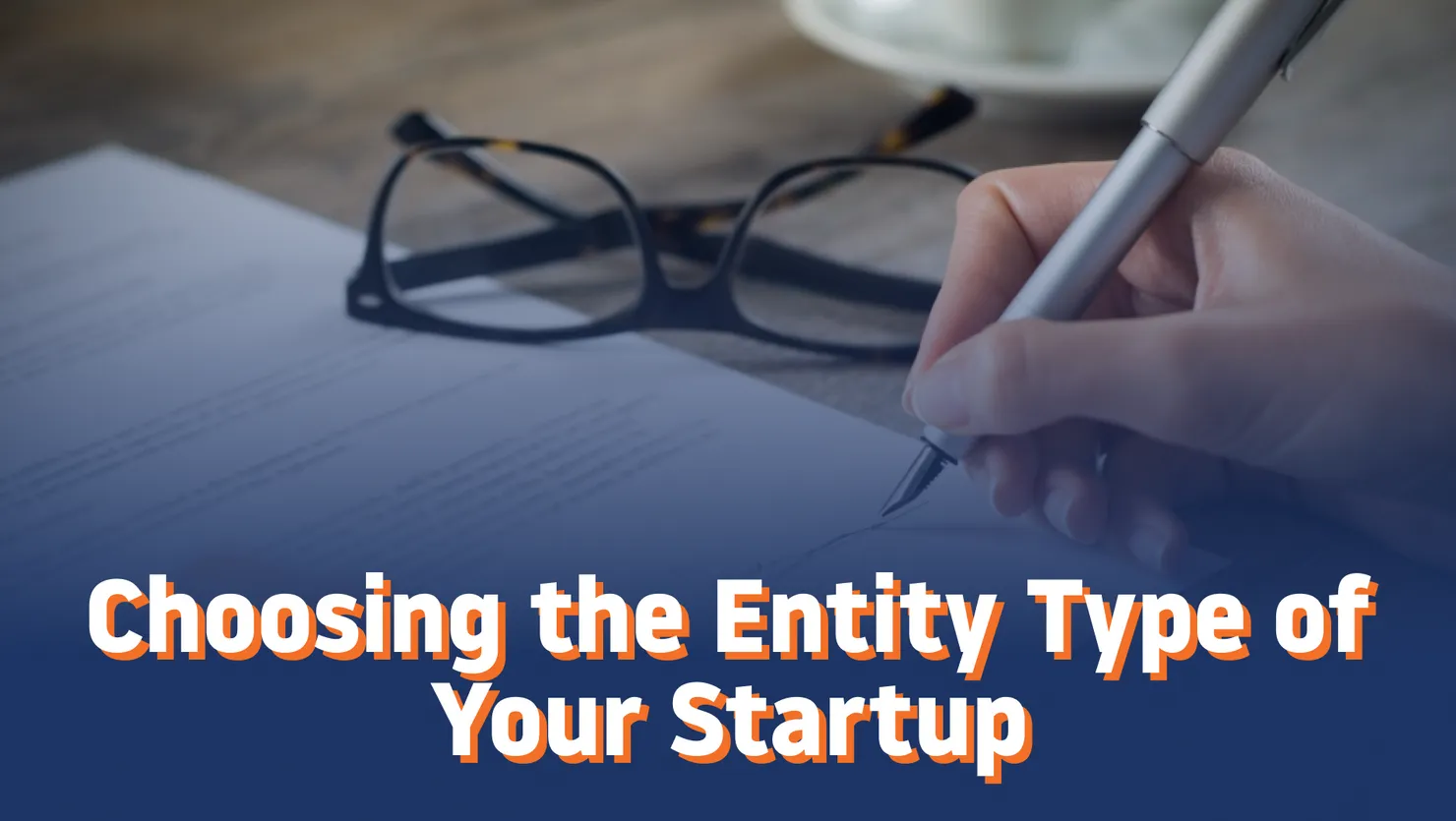Choosing the Entity Type of Your Startup

A crucially important step of starting and running a business is choosing which business organization your company will take. With C-Corporations, S-Corporations, Partnerships, LLCs, GPs, LPs, LLPs, and, yes, LLLPs, the choice is anything but simple. While tax implications often lead the conversation, choosing the proper entity structure can make meeting the capital expansion needs, adding more investors and owners, and planning for exit strategies significantly easier.
The complexity of the decision leads to the one consistent piece of advice for the vast majority of entrepreneurs regarding the choice of entity. That is to seek the help of a business attorney. The business attorney will be able to ensure that all specific tax, employment, ownership, and funding goals for your company are considered, whether you, as the founder, thought of the issue or not.
Nonetheless, if you’re an entrepreneur or aspiring to be one, you probably want to learn more about this consequential decision. This blog is meant to provide considerations likely to arise in a choice-of-entity conversation with your lawyer. This blog is not legal advice; in fact, the only advice to be drawn from this blog is that you seek a lawyer in making this decision.
Before diving in, it is important to lay this piece of groundwork. C-Corporations, the entity form of nearly all publicly traded companies, is subject to a double tax, one on the corporate level and one on the shareholder level while S-Corporations, LLCs, and other Partnership forms, are pass-through entities subject to tax only at the ownership level. While LLCs are currently the most common form of new business entity because of their flexibility, the current corporate tax rate of 21% might make the C-Corporation the optimal choice. It depends on your specific plan.
If you plan to reinvest all of your business’ earnings back into it in order to facilitate growth, then C-Corporations likely are going to be your best option depending on the tax rates of the owners. Currently, any earnings that are kept in a C-Corporation are subject to a 21% tax rate and, as long as those earnings have a designated purpose by the board of directors, will not be subject to an accumulated earnings tax. Earnings of pass-through entities, including LLCs, are taxed at the rates of their owners ranging from 10% to 37%. Further for pass-through entities, there is a newly qualified business income tax deduction that may allow for a 20% deduction of the shareholder's taxable income from a qualified business. The difference between having to pay taxes on 21% and 37% of earnings is enough to control the choice of entity decision in most cases, but clearly, the difference is not always as stark as 16%. A tax professional should assist in determining the applicable tax rates.
If the business will be your full-time employment and is structured in a way that is meant to provide for you and your family, then the ability to bailout earnings and other tax considerations, such as self-employment taxes or the fringe benefit deduction, may control your decision. Opposite to retaining earnings, when a C-Corporation distributes earnings it is subject to a double-tax leading to a much bigger tax bite. C-Corporation distributions are subject to the 21% tax rate and the shareholder's dividend rate, which could range from 0% to 20%. Pass-through entities will only be subject to the single tax at the owner’s rate; plus the qualified business income deduction of 20% may be available. Seems like a simple decision, but, as promised, it gets more complex. Partnership distributions may be subject to self-employment taxes, while C-Corporation distributions are not. Shareholders and employees of C-Corporations, but not pass-through entities, have the fringe benefit deduction available to them, which would also allow you, as an employee, to have benefits such as group-term life insurance or medical-dental insurance plans.
If meeting the needs of your investors are your highest priority, then it will depend on their preference for return on investment. One of the few controlling factors is the investor's willingness to pay taxes on income that was retained in the company and to undertake the risk of company audits reaching their returns. Investors unwilling to pay taxes on income not received in hard cash or to complicate their personal tax returns will require a C-Corporation form as all pass-through entities put the investor at risk of those consequences. Other investors may wish for losses to be allocated to them to recoup their investment while the business is unprofitable. These investors, often those with other streams of income, will opt out of investing in C-Corporations because losses in C-Corporations are retained with the business. Instead, their needs are better served by a pass-through entity which will allocate losses based on the Operating or Partnership Agreement. Further, these investors, if not material participants in the operations, may be seeking to increase their passive income, which allow gains to be offset by losses and losses to offset other business gains.
If maintaining control is your main concern, it will turn on the aggressiveness of your investors in seeking control. Corporations, C or S, and limited partnerships give the majority shareholders control over the business without an agreement stating otherwise, but the minority often has no control rights or authority over the business. This lack of rights may give pause to minority investors who want to have more say in the business operations. LLCs and general partnerships require operating/partnership agreements to layout the control structure of majority and minority interest holders. If the minority investors are aggressive and eventually a threat to overtaking the company, then negotiating the control rights of both groups in an operating agreement could lead to loss of control rights that otherwise would have been secured if a C or S Corporation or limited partnership was chosen.
Finally, if selling out at the end is your ultimate goal, then a variety of factors can push the discussion. First, when an owner sells a pass-through entity, the realized gains are taxed based on the owner’s proportional interest in the company with each owner paying their individual income tax rate on their portion. This single tax is unlike C-Corporations which must pay 21% of the realized gain at the corporate level before the remainder is taxed on the shareholder level at each individual’s income or capital gains tax rate. With that said, the shareholders of the C-Corporation may qualify for the Section 1202 deduction, which could eliminate the tax at the shareholder level. Now for more complexity; the basis the shareholder has in their interest can dictate the amount of income that has to be recognized. If earnings have been retained in the C-Corporation, the basis of the shareholders is likely still relatively low, which will lead paying tax on more income. The same is not true of pass-through entities because the shareholder's basis is increased by the entity’s earnings.
Clearly from this brief overview, this decision is very complex and significantly more nuanced than one may be led to believe. In most cases, you will have competing interests that require a balancing analysis of the pros and cons. Even if you have read this whole blog, which would show extreme dedication to learning, this decision shamelessly requires the help of an attorney.









